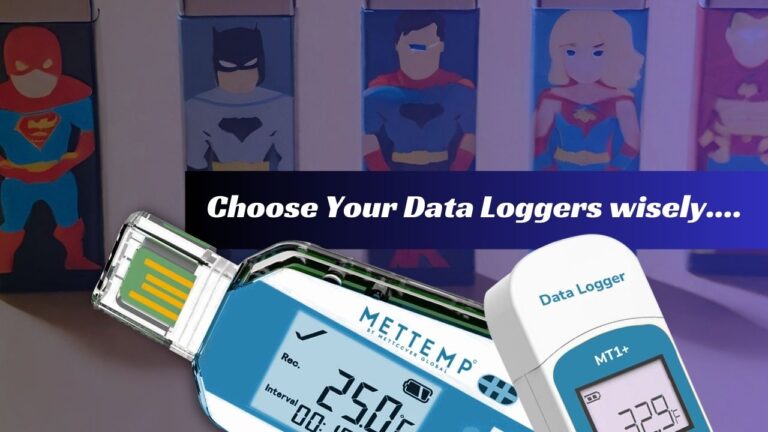I Want to Buy Data Loggers But How to Purchase the Best Ones for Cold Chain? A Buyer’s Guide.
- Sujeet Mishra

As an experienced supply chain professional, I understand the indispensable role data loggers play in maintaining the integrity of the cold chain. The logistics and transportation of temperature-sensitive goods require precision and reliability, and a data logger is your trusted ally in this journey. With a range of options available in the market, choosing the right data logger becomes crucial for ensuring the safety and quality of your products. In this guide, my aim is to share my understanding of buying the correct data loggers, based on my experiences. Let’s explore the importance of data loggers and dissect the key factors to consider when selecting one.
But first. What is a cold chain Data Logger?
Cold Chain Data loggers, also known as temperature recorders, are compact electronic devices (about the size of a pen drive) designed to record and store temperature data over a specific period. They come with various sensors to measure and monitor parameters like temperature, and humidity. Some devices even come with a light sensor to detect a door or box opening event during the transit. Once the temperature-sensitive shipments have arrived at their destination, the receiver can simply connect the logger’s USB in any computer and extract comprehensive reports to view the exact temperature range that was maintained in the pallet load or inside an insulated shipping container or in any other medium that was used to transport the cargo.
Data loggers offer a hands-off approach to data collection, ensuring accuracy and reliability in a multitude of cold chain environments, including cold storage and research laboratories. Usage of Single Use Data Loggers is fairly a popular practice in intercontinental and domestic transits.
Why Should You Care?
Imagine you’re responsible for transporting a shipment of pharmaceuticals that must be stored at a precise temperature. A slight deviation could render the entire batch ineffective or even dangerous. This is where data loggers come into play.
Spot-On Data: It’s a technological marvel that captures accurate information round the clock. That’s what a data logger does. No more manual errors, just precise, real-time data.
Peace of Mind: These nifty gadgets continuously monitor and report on conditions. So, you can focus on the big picture while they handle the details.
Saving Dollars: Manual monitoring can be a pricey affair. Data loggers save you from that. They are cost-effective in the long run, giving you a bang for your buck.
No Compliance Headaches: In many industries, there are rules. Compliance is key. Data loggers make sure you’re compliant with all the necessary regulations.
Quality Assurance: Especially crucial in sectors like pharmaceuticals and food, data loggers ensure the quality of products by maintaining the right environment.
Importance of Data Loggers in Cold Chain Management
Accurate Data Acquisition:
Data loggers provide precise and real-time data, eliminating potential human errors associated with manual data collection.
Efficient Monitoring:
These devices continuously monitor environmental conditions, ensuring that parameters remain within acceptable ranges.
Cost-Effectiveness:
Data loggers offer a cost-effective solution for continuous monitoring, minimizing the need for manual oversight.
Compliance and Reporting:
In regulated industries, such as Pharmaceuticals, Food and Perishables, data loggers assist in compliance with industry standards by providing comprehensive data for reporting and auditing purposes.
Improved Product Quality:
Especially critical in industries like pharmaceuticals and food, data loggers help maintain optimal storage conditions, preserving product quality and safety.
How to choose the right data logger: A Buyer’s Guide
Selecting the appropriate data logger involves considering various parameters to ensure it meets your specific requirements. Here’s a comprehensive guide to help you make an informed decision:
1. Regulatory Compliance
Understanding the regulatory requirements of your industry is paramount. Ensure the data logger complies with necessary regulations such as 21 CFR Part 11, WHO, or UNICEF standards. Also ensure that you are buying Airlines Approved Data Loggers in case you are sending your cargo through air. Almost every airline periodically publishes a list of data loggers that are approved for in flight use. The approved data logger models, in this case, may differ with each carrier company.
Popular Regulatory Compliance Standards for Data Loggers.
| Compliance Standard | Description |
| WHO | World Health Organization |
| CE Mark | Conformité Européene (European Conformity) |
| ISO Certification | International Organization for Standardization Certification |
2. Efficiency Factors
Efficiency in data logging is vital for ensuring the accuracy and reliability of the recorded data. An efficient data logger is capable of accurately recording temperature variations and excursions, providing real-time insights into the conditions your products are exposed to. To put it simply, before you buy a data logger inquire about how many data cycles can it record (the popular range is anywhere between 16,000 – 32,000 data cycles)
What Parameters Make A Data Logger Efficient?
| Efficiency Parameters | Description |
| Excursion Count | The maximum number of excursions the logger can record, indicating its efficiency in capturing fluctuations. Data Loggers are configured to record temperature at specific time intervals (for ex. every five minutes). More data cycles ensure that the logger can record temperature & humidity for a longer period of time. |
| Temperature Measurement Range | The range of temperatures the logger can accurately measure, ensuring it caters to the specific requirements of your products. In most cases a data logger that can record a temperature range of -30°C to +70°C works well in cold chain management, however, sensitive shipments like some vaccines and frozen food may require thermal integrity beyond that range. |
| Measurement Accuracy | The precision with which the logger measures temperature, significantly impacting the reliability of the recorded data. Most data loggers are calibrated to record temperature variations with ± 0.5°C and humidity with 1.0 RH. |
3. Durability:
It is only prudent to buy a data logger that is durable and can withstand the arduous journey. Therefore, durability and build quality is a paramount consideration when selecting a data logger. The logger should be able to withstand the often harsh and varied environmental conditions encountered during transportation and storage. Factors like battery life, shelf life, and water resistance play a crucial role in determining the durability of the logger.
Durability Factors to Consider While Buying Data Loggers
| Durability Factors | Description |
| Battery Life | The duration for which the logger’s battery remains operational, ensuring continuous monitoring during long journeys. Look for a data logger with at least 2 years of battery life (in dormant state). |
| Shelf Life | The period for which the logger remains functional and retains its accuracy while in storage before use. Data Loggers come with an expiry date, beyond which they may need recalibration. In case if single use data loggers, recalibration option is also not available. A wise choice would be to purchase a data logger with 2 years of shelf life. |
| Water Resistance | The level of protection the logger has against water or moisture, a crucial factor for safeguarding its functionality. Again depending on the modality of your cold chain route and nature of your cargo, you should make an informed choice here. A data logger with IP67 rating offers superior water resistance while in some cases an IP65 rating may also work. |
Choosing a data logger with extended battery life and a durable design is essential to ensure reliable and uninterrupted monitoring of temperature-sensitive products throughout the cold chain. A longer battery and shelf life also curtails the cost of recalibration and of frequently buying new data loggers
4. Usability:
A user-friendly data logger simplifies the monitoring process, making it more efficient and productive. Ease of use is determined by factors such as memory capacity, data access options, and alarm settings.
Usability Features for Enhanced Monitoring
| Usability Features | Description |
| Memory Capacity | The amount of data the logger can store, impacting the duration it can monitor and the volume of data it can capture. |
| Data Access Options | Various methods available to access recorded data, such as USB connectivity, wireless access, or proprietary software. In cold chain management, most professionals prefer a PDF Plug-n-Play data logger for readily downloadable reports. Do care to check the software support you are getting with the logger. Data Logger software are essential to reconfiguring the device and for downloading more comprehensive report formats such as CSV, Time-Heat range graphs and Data Cycle Reports. |
| Alarm Settings | Configurable alarms that notify deviations from the specified temperature range, ensuring immediate corrective actions. I recommend that if you are buying a single use data logger, go for a device that offers at least five alarm thresholds. A broad spectrum alarm setting allows you to use the loggers in a diversified manner. |
A data logger with user-friendly features enhances usability, allowing for efficient monitoring and prompt action in case of temperature deviations.
5. Usage Cost:
While considering the cost of a data logger, it’s crucial to strike a balance between the initial investment and the overall value it provides. Assess the total cost of ownership, including the initial purchase cost, maintenance, and any additional expenses.
Factors Impacting The Usage Cost of Data Loggers
| Cost Factors | Description |
| Initial Cost | The upfront cost of purchasing the data logger. |
| Maintenance Cost | Costs related to maintenance, calibration, and servicing. |
| Total Ownership Cost | The cumulative cost of owning and operating the data logger over its lifetime. |
Considering the long-term benefits of a reliable data logger is crucial, even if it entails a higher initial investment.
6. Memory Capacity and Logging Time:
Memory capacity and logging time are essential considerations, especially for long journeys or extended storage periods. A data logger with ample memory capacity can record a higher volume of data that is crucial for longer shipments.
7. Data Access Options:
Efficient data access options are vital for extracting valuable insights from the recorded data. Whether it’s through USB, wireless connectivity, or innovative scanning methods, convenient data access enhances decision-making and ensures a seamless cold chain.
Making an Informed Choice
The importance of data loggers in ensuring the safety and quality of temperature-sensitive goods cannot be overstated. Carefully assessing these key factors and understanding their impact on the reliability and effectiveness of a data logger is instrumental in maintaining the integrity of the cold chain. Your choice of a data logger is, indeed, an investment in the safety of the products you transport and store, and it should be made with careful consideration and a long-term perspective.
Remember, the right data logger isn’t just a tool; it’s a partner in ensuring the safety, quality, and compliance of your products. Choose wisely, invest thoughtfully, and embark on a journey of a seamless cold chain with confidence. At the core of their functionality is continuous monitoring and recording of temperature fluctuations during transit or storage. Whether it’s vaccines, perishable food, or sensitive chemicals, maintaining the ideal temperature is vital for their efficacy and safety. The data logger ensures that the specified temperature range is consistently maintained, providing real-time insights into the conditions your products are exposed to.
I hope that the information gained through my experiences can help you and look forward to addressing any additional queries that you may have. Please feel free to connect with us via Linkedin.
Thankyou for your time.




